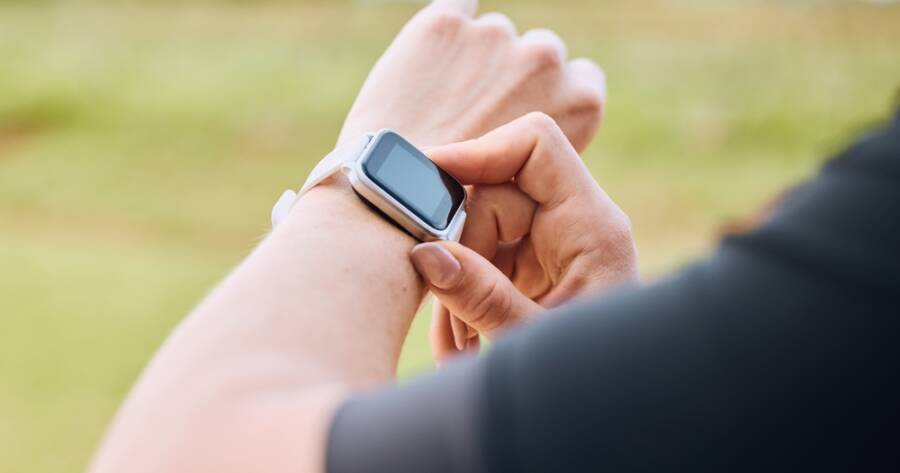In a world where health and tech go hand in hand, fitness trackers have become everyday essentials. From counting steps and tracking sleep to monitoring heart rate and stress, today’s wearables are more advanced, and stylish than ever. With 2025 bringing new models, smarter sensors, and sleeker designs, how do you know which fitness tracker is right for you? Whether you’re a seasoned athlete, a weekend warrior, or just starting your wellness journey, explore a roundup of the best fitness trackers of 2025, each one worth strapping on your wrist.
1. Apple Watch Series 10: The Smartest All-Around
Apple’s latest model continues to dominate the wearable market, and for good reason. The Apple Watch Series 10 combines sleek design with powerful functionality. This year, it adds more advanced health features like continuous glucose monitoring and enhanced AI-driven fitness coaching.
Best for: iPhone users who want seamless integration, powerful health features, and smartwatch capabilities.
Pros:
- Beautiful display
- Comprehensive health tracking
- ECG, SpO2, and new glucose monitoring
- App ecosystem
Cons:
- Pricey
- Requires daily charging
2. Fitbit Charge 6: Budget-Friendly Performance
For those who want reliable tracking without breaking the bank, the Fitbit Charge 6 remains a solid choice. With built-in GPS, heart rate tracking, sleep scoring, and a full week of battery life, it covers all the essentials and more.
Best for: Budget-conscious users who want dependable fitness features.
Pros:
- Great value
- Accurate fitness and sleep tracking
- Slim, lightweight design
- Long battery life
Cons:
- Limited third-party apps
- Smaller screen
3. Garmin Venu 3: For the Serious Athlete
The Garmin Venu 3 caters to fitness enthusiasts and endurance athletes. It’s built for performance, with advanced metrics for running, cycling, swimming, and strength training. The new recovery advisor and real-time stamina tracking make it a powerhouse for training and recovery.
Best for: Athletes and high-performance users.
Pros:
- Best-in-class fitness metrics
- Exceptional GPS accuracy
- Durable design
- Battery life up to 10 days
Cons:
- Steeper learning curve
- Higher price point
4. Whoop Strap 5.0: The Recovery King
The Whoop Strap 5.0 isn’t just about tracking steps or workouts—it’s designed to optimize recovery, sleep, and strain. It doesn’t have a screen, but its app provides deep insights into your body’s readiness and recovery status.
Best for: Serious users focused on recovery and performance data.
Pros:
- Advanced sleep and recovery insights
- Comfortable, screen-free design
- Monthly membership includes device
Cons:
- Subscription-based
- Not ideal for casual users
5. Oura Ring Gen 4: Sleek and Subtle
Not into wearing something on your wrist? The Oura Ring Gen 4 is a discreet yet powerful option. This ring tracks sleep, readiness, heart rate, temperature, and now, real-time activity levels. It’s perfect for those who value minimalism with maximum performance.
Best for: Users who want a sleek, non-wrist-based option focused on health insights.
Pros:
- Ultra-discreet
- Great sleep and recovery tracking
- Long battery life
Cons:
- No screen
- Limited fitness features
6. Samsung Galaxy Fit 3 Pro: Android’s Answer to Apple
Android users rejoice, the Galaxy Fit 3 Pro is here. With a bright AMOLED screen, automatic workout detection, and new body composition analysis, it offers premium features at a mid-range price. It pairs easily with Samsung Health and other apps.
Best for: Android users looking for a stylish, capable tracker.
Pros:
- Affordable
- Beautiful display
- Advanced health metrics
Cons:
- Best features tied to Samsung ecosystem
- Battery life could be better
Fit for Your Lifestyle
The best fitness tracker is the one that fits your lifestyle, goals, and budget. From all-in-one smartwatches to minimalist rings, 2025 offers a wearable for every type of user. Whether you’re tracking steps, optimizing sleep, or training for a marathon, there’s never been a better time to get tech on your side—and on your wrist.

